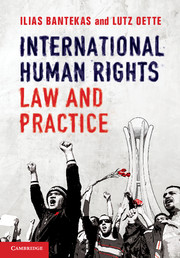Book contents
- Frontmatter
- Contents
- List of abbreviations
- Table of Cases
- Introduction
- 1 International human rights law and notions of human rights: foundations, achievements and challenges
- 2 International human rights law: the normative framework
- 3 Human rights in practice
- 4 The United Nations Charter system
- 5 The UN human rights treaty system
- 6 Regional human rights treaty systems
- 7 Individual complaints procedures
- 8 Civil and political rights
- 9 Economic, social and cultural rights
- 10 Group rights: self-determination, minorities and indigenous peoples
- 11 The human rights of women
- 12 The right to development, poverty and related rights
- 13 Victims’ rights and reparation
- 14 The application of human rights in armed conflict and the international criminalisation process
- 15 Human rights and counter-terrorism
- 16 Non-state actors and human rights
- 17 Globalisation and its impact on human rights
- Index
- References
16 - Non-state actors and human rights
- Frontmatter
- Contents
- List of abbreviations
- Table of Cases
- Introduction
- 1 International human rights law and notions of human rights: foundations, achievements and challenges
- 2 International human rights law: the normative framework
- 3 Human rights in practice
- 4 The United Nations Charter system
- 5 The UN human rights treaty system
- 6 Regional human rights treaty systems
- 7 Individual complaints procedures
- 8 Civil and political rights
- 9 Economic, social and cultural rights
- 10 Group rights: self-determination, minorities and indigenous peoples
- 11 The human rights of women
- 12 The right to development, poverty and related rights
- 13 Victims’ rights and reparation
- 14 The application of human rights in armed conflict and the international criminalisation process
- 15 Human rights and counter-terrorism
- 16 Non-state actors and human rights
- 17 Globalisation and its impact on human rights
- Index
- References
Summary
Introduction
In previous chapters we had a chance to examine the effect, both negative and positive of NSAs on human rights, particularly terrorists, NGOs and private companies, the latter in the context of economic and social rights. The present chapter sets out to explore the theoretical underpinnings of a much larger debate as to whether NSAs possess, or should possess, human rights obligations, much in the same way as states. This debate, as will be demonstrated, is not merely theoretical, because if we are to confer such obligations to actors other than states, then we should rethink the entire architecture and rationale of the human rights system since it has traditionally been founded on the idea that by abusing their power governmental actors violate human rights. In any event, it is evident that NSAs have a significant impact on the enjoyment of human rights and that as a result some regulation and intervention is required.
The chapter sets off by examining the theoretical bases upon which an NSA may be deemed to possess human rights obligations and critiques the various approaches put forward by states and the scholarly community. It then goes on to examine a variety of NSAs along with their own distinct position as regards their human rights role. Some, such as international financial institutions, take a legalistic approach to the matter and are generally wary of accepting even the more fundamental obligations, whereas others are keen to achieve a broader human rights agenda and are willing to accept human rights commitments. Besides intergovernmental organisations we shall also be focusing on MNCs and the way in which their operations have a significant impact on the rights of populations worldwide. It shall be demonstrated that while their human rights ‘obligations’, if any, have largely arisen as a result of voluntary undertakings they are now entering a hybrid phase of limited regulation, or at least of an attempt at regulation. Finally, we shed some light on national liberation movements and rebel groups and their distinct responsibilities under international humanitarian law.
- Type
- Chapter
- Information
- International Human Rights Law and Practice , pp. 656 - 686Publisher: Cambridge University PressPrint publication year: 2013



